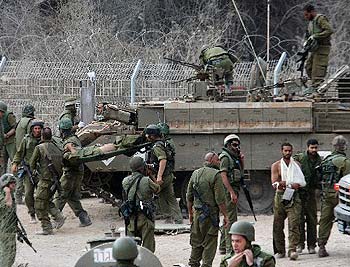
Israeli army medical personnel treat wounded comrades
near the Israel -Lebanon border, yesterday. -Xinhua/Reuters
An expansion of the Israeli army's ground operations in Lebanon is on hold so
as to allow time and room for diplomatic efforts toward a solution to the
30-day-old fighting between Israel and Lebanon's Hezbollah, said Israeli
ministers yesterday.
On Wednesday, the Israeli security cabinet approved in principle the defense
establishment's plan for an expanded ground offensive in south Lebanon.
But Israeli ministers said on Thursday that the cabinet had delayed the
widening of ground operations in order to give more time to the UN Security
Council to work out a deal to end the violence.
"We have to exhaust all the diplomatic options, especially when important
diplomatic efforts are being exerted in New York for a solution," Israeli
Minister of Justice Haim Ramon told Israel's public radio.
Meanwhile, Minister of Tourism Isaac Herzog said, "A political process is
currently underway and our sense of responsibility tells us to give it a little
more time."
"It is important that Israel remains open to diplomatic options at this
time," he added.
Israeli Vice Premier Shimon Peres, one of the three ministers who abstained
from the vote over the expansion of ground operations during Wednesday's
security cabinet meeting, said that he preferred to give the diplomatic channels
a chance to solve the conflict.
Minister of Science and Technology Ophir Pines-Paz from the left-wing Labor
party, who also abstained, said that he believed Israel was rushing into
military engagements before exhausting diplomatic options.
The security cabinet has authorized Prime Minister Ehud Olmert and Defense
Minister Amir Peretz to decide when to expand the ground offensive, which
Israeli officials said might last at least 30 days.
"In a way, the decision is a threat for what will happen if there is no
progress in negotiations," said one Labor minister in the cabinet who spoke on
condition of anonymity.
"It's meant to pressure relevant parties to move forward, or Israel will be
forced to exercise its full force," the minister added.
Meanwhile, the cabinet's approval of widening ground operations in Lebanon
has sparked disputes among Israeli lawmakers.
Left-wing legislators have voiced protests in the Knesset (Parliament)
against the decision.
"This decision will become a death trap for Israeli soldiers," said lawmaker
Zahava Gal-On of the left-wing Meretz party. "The cabinet decision will reduce
the possibility of a ceasefire agreement."
Meretz Chairman Yossi Beilin also called the cabinet's decision "a tragic
mistake", saying that Israel was on the verge of "a war of attrition on the
ground."
In addition, many Arab lawmakers protested the cabinet's go-ahead to widening
ground moves, with legislator Mohammad Barakeh slamming it as "insanity
testifying to military arrogance."
"This is the time for diplomatic initiatives but not military adventures,"
said Taleb a-Sanaa, another Arab lawmaker, who has repeatedly urged the cabinet
to ignore its "militant instincts" and resort to diplomatic channels instead of
military operations.
But the right-wing Knesset members have lent strong support to the expansion,
with many praising it as a "brave and just decision."
"Finally, the government gave the Israel Defense Forces the mandate to defend
the country from missiles and rockets," said lawmaker Yuval Steinitz of the
Likud party, urging the government to deploy the troops to south Lebanon as soon
as possible.
"The simple truth is that only the Israeli army can fight Hezbollah and
eradicate its military presence in southern Lebanon," Steinitz added.
Led by Benjamin Netanyahu, the opposition Likud party has been the most
staunch supporter for Olmert's government since the conflict between Israel and
Lebanon's Hezbollah broke out on July 12, causing many to call Netanyahu the
"un-opposition leader."
Other opposition parties, such as NU-NRP, have also supported the ongoing
massive Israeli offensive in Lebanon.
Effie Eitam, a NU-NRP lawmaker, said the cabinet's decision was "brave and
unavoidable in light of the Hezbollah assaults on Israel's cities."
"We must remember that there are no happy wars, but the Israeli army must
achieve a victory and bring triumph to the State of Israel," Eitam said.
While Israel holds off the expansion of ground operations in south Lebanon,
the UN Security Council is working close to a deal aimed to put an end to the
over-four-week-old violence.
France, which has proposed a draft resolution along with the United States,
said on Thursday that a breakthrough could come soon in the diplomatic efforts.
"Things are moving in New York today. I hope they move even more rapidly and
in the hours to come," French Foreign Minister Philippe Douste-Blazy told
reporters.
U.S. Ambassador to the UN John Bolton also said that there could be a vote of
the Security Council over a draft resolution by Friday.



